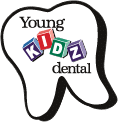How can I prevent decay caused by nursing?
Avoid nursing children to sleep or putting anything other than water in their bed-time bottle. Also, learn the proper way to brush and floss your child’s teeth. Take your child to a pediatric dentist regularly to have his/her teeth and gums checked.
What should I use to clean my baby's teeth?
A toothbrush will remove plaque bacteria that can lead to decay. Any soft-bristled toothbrush with a small head, preferably one designed specifically for infants, should be used at least once a day at bedtime.
Toothpaste: When should we begin using it and how much?
Fluoridated toothpaste should be introduced when a child is 2-3 years of age. Prior to that, parents should clean the child’s teeth with water and a soft-bristled toothbrush. When toothpaste is used after age 2-3, parents should supervise brushing and make sure the child uses no more than a pea-sized amount on the brush. Children should spit out and not swallow excess toothpaste after brushing.
How do I know if my child is getting enough flouride?
Have your pediatric dentist evaluate the fluoride level of your child’s primary source of drinking water. If your child is not getting enough fluoride internally through water (especially if the fluoride level is deficient or if your child drinks bottled water without fluoride), then your pediatric dentist may prescribe fluoride supplements.
How do I make my child's diet safe for his/her teeth?
Make sure your child has a balanced diet, including one serving each of: fruits and vegetables, breads and cereals, milk and dairy products, and meat fish and eggs. Limiting the servings of sugars and starches will also aid in protecting your child’s teeth from decay. You can also ask your pediatric dentist to help you select foods that protect your children’s teeth.
Are thumbsucking & pacifier habits harmful to my child's teeth?
Thumb and pacifier sucking habits will generally only become a problem if they go on for a very long period of time. Most children stop these habits on their own, but if they are still sucking their thumbs or fingers when the permanent teeth arrive, a mouth appliance may be recommended by your pediatric dentist.
What can I do to protect my child's teeth during sporting events?
Soft plastic mouthguards can be used to protect a child’s teeth, lips, cheeks and gums from sport related injuries. A custom-fitted mouthguard developed by a pediatric dentist will protect your child from injuries to the teeth, face and even provide protection from severe injuries to the head.
How often does my child need to see a pediatric dentist?
A check-up every six months is recommended in order prevent cavities and other dental problems. However, your pediatric dentist can tell you when and how often your child should visit based on their personal oral health.
How do dental sealants work?
Sealants work by filling in the crevasses on the chewing surfaces of the teeth. This shuts out food particles that could get caught in the teeth, causing cavities. The application is fast and comfortable and can effectively protect teeth for many years.
How safe are dental X-rays?
There is very little risk in dental X-rays. Pediatric dentists are especially careful to limit the amount of radiation to which children are exposed. Lead aprons and high-speed film are used to ensure safety and minimize the amount of radiation.




